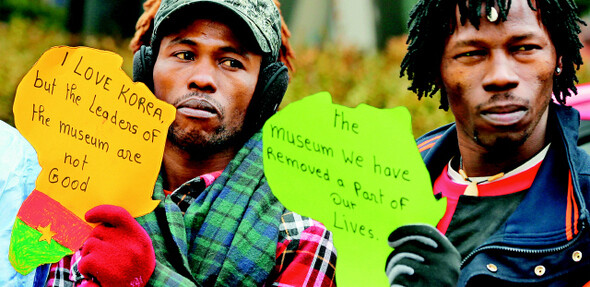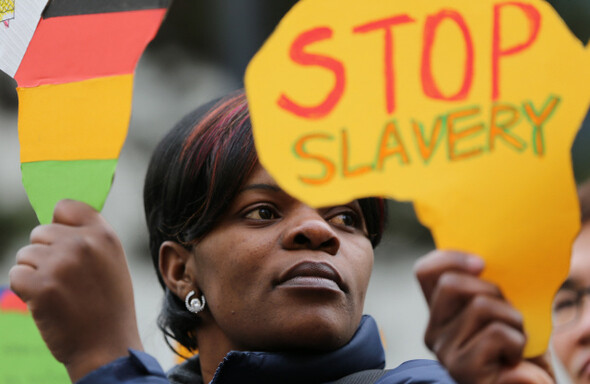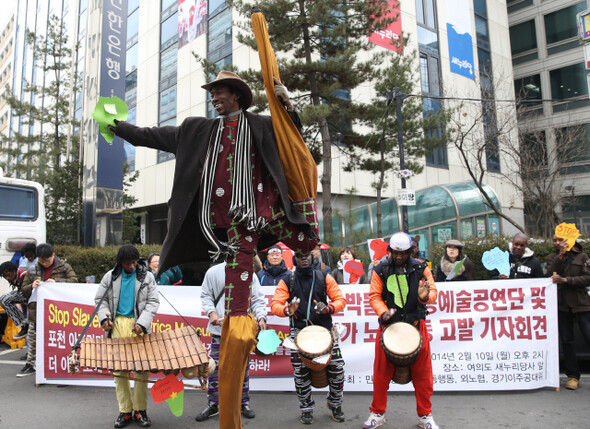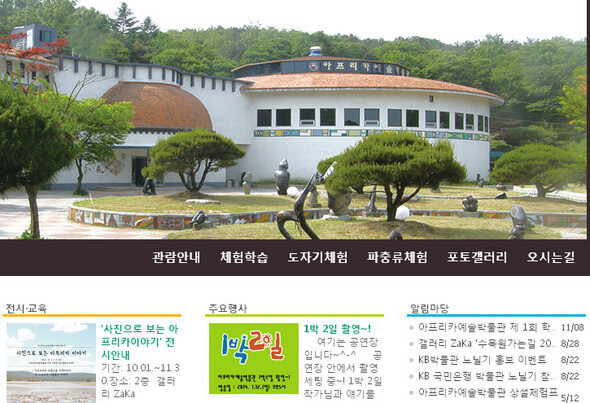hankyoreh
Links to other country sites 다른 나라 사이트 링크
African museum performers protest working in slave-like conditions

By Bang Jun-ho, staff reporter
Faina arrived in South Korea in November 2009. The 27-year-old Zimbabwean had wanted to share her home country’s sculptures with the world. But her dream was quickly shattered. Her experience at the Africa Museum of Original Art (AMOA) in Pocheon, Gyeonggi Province, was similar to indentured servitude.
Faina earned 500,000 won a month - around US$466 - sculpting for the museum. The legal minimum wage should have entitled her to monthly earnings of 1,269,154 won (US$1,183). Every time she protested the low wages, museum administrators would tell her there was “no use complaining.”
“They told me the chairman was a very important man in Korea,” Faina recalled. “They said I could complain all I wanted and it wouldn’t make a difference.”
“After coming to Korea, my dream turned into a nightmare,” she added. The chairman of the museum is 59-year-old Hong Moon-jong, who also happens to be a senior lawmaker and secretary general for the ruling Saenuri Party (NFP).

Twelve migrant workers gathered in front of the Saenuri Party’s headquarters in Seoul’s Yeouido neighborhood on Feb. 10. They, like Faina, have been employed at the AMOA for sculpture, performances, and other duties. A total of 24 people were hired, but eight have since returned home, while another four have fled, they said.
The working conditions they described were virtual enslavement. No legal labor standards - minimum wage, suitable food stipends, vacation time - were observed. Museum administrators responded to complaints with contemptuous remarks about Africa. “I thought this was a lot of money in your country,” one of them reportedly said.
Emmanuel, a 34-year-old from Burkina Faso in northwest Africa, went to work as a dancer at the AMOA’s traditional performance center in 2012. He was paid 650,000 won (US$606) a month - less than half the legal minimum wage of 1,269,154 won (US$1,183).
“I was the best dancer in my home village,” Emmanuel said. “I have never been treated like this anywhere else in the world.”
“I have no money left now,” he added, his eyes tearful. “I have to go back home like this.”
Emmanuel and seven other performers from Burkina Faso saw their contracts expire on Feb. 9. They now have to leave the country by Feb. 27, when their artist visas expire.
The workers had to sleep in rooms where mice chewed at their clothes, and survive on spoiled rice. Razack, a 26-year-old from Burkina Faso, said they were deceived about their accommodations.
“When I signed a contract with the Africa Museum in Burkina Faso, I was told we were getting a nice dormitory with a television and a computer,” he recalled. “But when I actually came here, there were holes in the dormitory windows and the place was crawling with mice.”
The slate-roofed building also had a broken pane on its door, the performers said. Some rooms had no heating or insulation at all. Food cost 4,000 won (US$3.70) a day - up from 2,500 won (US$2.30) in July 2012.
“The money we made was nowhere near enough to cover three meals a day in Korea,” said Faina.
“When we complained, they gave us rice and told us to cook it ourselves. But it was spoiled. To save money, I had to make do cooking and eating that rice.”
After four of their Burkinabe colleagues took off and went underground, unable to stand the conditions, the remaining performers had their passports confiscated. “What about our rights?” they protested. They were told it was pointless to complain.
The contractual terms on performances - three per day - were not observed either. Workers reported doing anywhere from four to six performances a day. None received extension bonuses, severance pay, or pay for unused leave.

During their press conference in front of Saenuri headquarters, the performers performed on the traditional dundun and barafon instruments. Signs in the shape of Africa bore messages such as “We are free,” and “I love Korea but the leader of the museum is not good.” They also chanted in slightly awkwardly phrased Korean: “We are not animals. Treat us like human beings.”
“We need to understand what brought these people out here like this in Yeouido on such a cold day,” said Ju Bong-hee, vice president of the Korean Confederation of Trade Unions. “These are things that happened in the 21st century at a museum run by a third-term lawmaker in the ruling political party.”
“It’s just sickening to see,” Ju said.
Instead of making an explanatory announcement himself, Hong Moon-jong had AMOA director Park Sang-soon issue an explanatory statement on his behalf. Park said, “The contract was made in compliance with the legal minimum wage. Their current wage is 1,100,000 won ($US1,025), while they do only three 40 minute performances a day”.
Park also said, “Of the three accommodations, one of them was old and living conditions there were poor. Migrant workers often tend to disappear and stay illegally to work, so we had no choice but to keep all their passports. But I now regret that this was not done in the appropriate way”.
Park added, “Hong Moon-jong is not directly involved in management of the museum due to his tight schedule as a lawmaker”. Hong took over the AMOA in August 2010 and has been involved with the museum management since then.

Please direct questions or comments to [english@hani.co.kr]

Editorial・opinion
![[Column] Park Geun-hye déjà vu in Yoon Suk-yeol [Column] Park Geun-hye déjà vu in Yoon Suk-yeol](https://flexible.img.hani.co.kr/flexible/normal/500/300/imgdb/original/2024/0424/651713945113788.jpg) [Column] Park Geun-hye déjà vu in Yoon Suk-yeol
[Column] Park Geun-hye déjà vu in Yoon Suk-yeol![[Editorial] New weight of N. Korea’s nuclear threats makes dialogue all the more urgent [Editorial] New weight of N. Korea’s nuclear threats makes dialogue all the more urgent](https://flexible.img.hani.co.kr/flexible/normal/500/300/imgdb/original/2024/0424/7317139454662664.jpg) [Editorial] New weight of N. Korea’s nuclear threats makes dialogue all the more urgent
[Editorial] New weight of N. Korea’s nuclear threats makes dialogue all the more urgent- [Guest essay] The real reason Korea’s new right wants to dub Rhee a founding father
- [Column] ‘Choson’: Is it time we start referring to N. Korea in its own terms?
- [Editorial] Japan’s rewriting of history with Korea has gone too far
- [Column] The president’s questionable capacity for dialogue
- [Column] Are chaebol firms just pizza pies for families to divvy up as they please?
- [Column] Has Korea, too, crossed the Rubicon on China?
- [Correspondent’s column] In Japan’s alliance with US, echoes of its past alliances with UK
- [Editorial] Does Yoon think the Korean public is wrong?
Most viewed articles
- 1‘We must say no’: Seoul defense chief on Korean, USFK involvement in hypothetical Taiwan crisis
- 2N. Korean delegation’s trip to Iran shows how Pyongyang is leveraging ties with Moscow
- 346% of cases of violence against women in Korea perpetrated by intimate partner, study finds
- 4Amnesty notes ‘erosion’ of freedom of expression in Korea in annual human rights report
- 5‘Weddingflation’ breaks the bank for Korean couples-to-be
- 6[Column] Park Geun-hye déjà vu in Yoon Suk-yeol
- 7Will NewJeans end up collateral damage in internal feud at K-pop juggernaut Hybe?
- 8Korea sees more deaths than births for 52nd consecutive month in February
- 9“Parental care contracts” increasingly common in South Korea
- 10[Interview] Dear Korean men, It’s OK to admit you’re not always strong